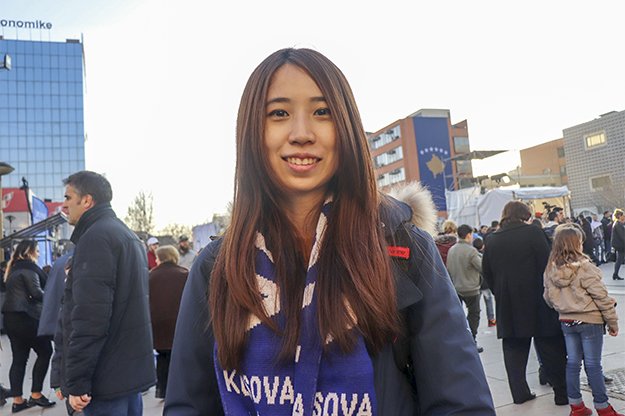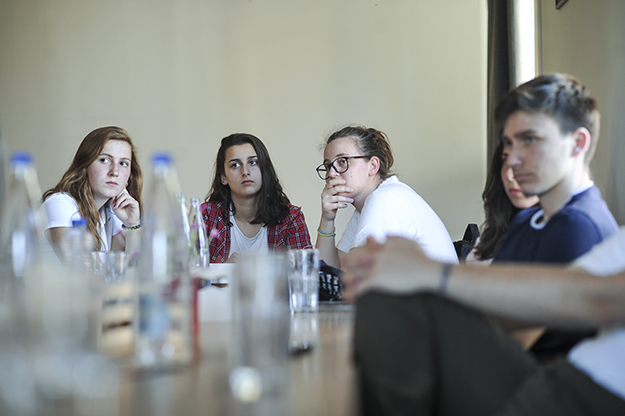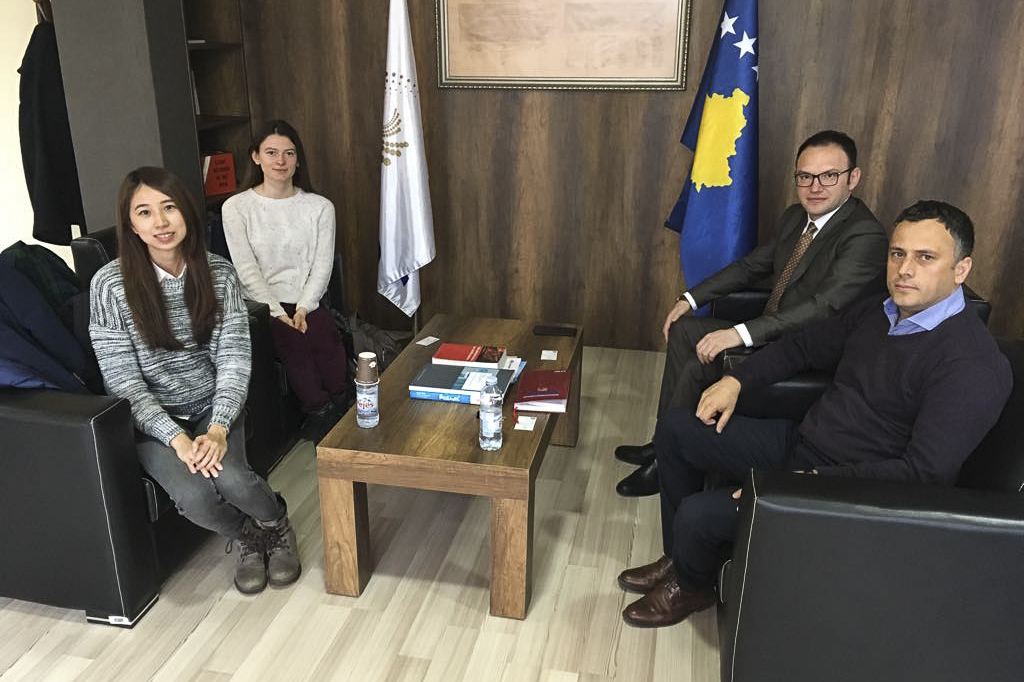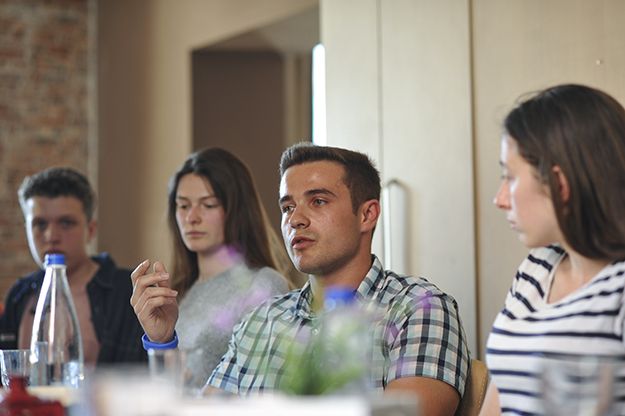Chiayo Kuo lays out her ambitious plans for Kosovo’s digital independence over a grainy Skype line from Taipei. Normally, she lives in central Prishtina, but she has briefly returned to her native Taiwan to raise funds for her newly-founded initiative. Soon, she will take the 17-hour flight back to Kosovo to resume work on her project. The object of her quest? A Kosovar country domain.
A national top-level domain — like Germany’s .de or Italy’s .it — is a crucial step for Kosovo’s international recognition, Kuo explains. That is why she started a group dedicated to the cause to lobby international organizations, diplomats and lawmakers. But how did a Taiwanese 26-year-old become the unlikely promoter of a relatively obscure tech issue in the Balkans? Let’s start from the beginning.

Chiayo Kuo, a 26-year-old from Taiwan, has been one of the unlikely activists leading Kosovo’s calls for digital independence. Photo courtesy of Chiayo Kuo.
It’s 2008. Kosovo celebrates as independence is declared. A few thousand miles away, a 16-year-old high-school student in Taipei follows the news intently. Recently, she has read Hong Kong author Zita Law’s science fiction book “Death One.” One chapter, not entirely commonly in the East Asian literary tradition, is set in Kosovo.
“I was immediately fascinated by the descriptions of the landscapes and the culture. I even wrote a school essay that was inspired by Kosovo,” Kuo remembers. “I promised myself that I would visit the country one day.”
Kuo grew up and went to university in Taipei, but the image of Kosovo remained vivid in her mind. In 2014, she won a scholarship to attend a master’s programme in public policy administration at the University of Budapest. Upon graduating, she embarked on a tour of the Western Balkans to finally see the land of her teenage dreams.
“I remember arriving in the middle of the night and my first impression was, ‘Wow, so many wedding dress shops,’” Kuo laughs. “The next day, I had made up my mind that I would come back.”
“I realized that I could use my experience to find a way to help Kosovo and build a bridge with Taiwan.”
Chiayo Kuo
A woman of action, she moved back to Taiwan and took two jobs to save up funds for a return. One of those jobs, at the innovation center at National Taiwan University, gave her first hand experience of the bustling tech startup sector in Taipei. Here, the importance of a functioning digital infrastructure and its worldwide connections became immediately clear. A plan started to take form.
“Taiwan is one of the most technologically advanced countries in the world,” Kuo says. “I realized that I could use my experience to find a way to help Kosovo and build a bridge with Taiwan.”
As Kuo worked back-to-back shifts in Taipei, Kreshnik Gashi was similarly busy in Prishtina. As the head of the Regulatory Authority of Electronic and Postal Communications (ARKEP) he had faced the significant task of dragging the agreement for a national telephone prefix to a close.
“As long as some issues remain unsolved, digital independence cannot fully happen. This is an important step for our statehood.”
Kreshnik Gashi
Having first been set out in the 2013 Brussels Agreement with Serbia, and later re-emphasized in the 2015 technical agreement, the first phone call using Kosovo’s own +383 prefix was made in 2017 and has since been widely rolled out. The domain issue was also on ARKEP’s desk during this time, but there was little time or resources left to attend to it. With the prefix issue largely resolved, that could change.
“We have been very busy with the telecom agreement, but we are currently negotiating the domain issue.” Gashi says. “As long as some issues remain unsolved, digital independence cannot fully happen. This is an important step for our statehood.”
While the telephone prefix garnered mainstream attention, the domain has remained a minor issue in the public eye. In fact, many citizens are unaware that Kosovo lacks a country domain. Yet its implications reach further than the purely technical realm.
If you have ever entered a Kosovar website, you may have noticed that almost all of them end with .com or .net. That applies to private companies, civil society organizations and the government itself. These generic top-level domains are normally used by organizations and companies without association to a particular country.
A country code top-level domain, in contrast, is based in a specific state or territory. While other countries are able to display the geographical origin of their site through the domain ending, Kosovars are forced to buy domain names from international registries. Try typing any address ending with .ks in your browser and you will not get far.
Available domain names ending in .com can cost as little as about 10 U.S. dollars (about 8 euros) a year, but the most attractive ones are usually already taken. Instead, owners of Kosovar websites have to compete on the international domain market to buy addresses — and the best names are rarely cheap; the domain name kosovo.com is currently for sale for the hefty sum of 750,000 U.S. dollars (approximately 630,000 euros).
While Google’s algorithm takes your location into account, local results are more likely to be drowned out by results from other countries at google.com.
That leaves Kosovar webmasters having to settle for convoluted website addresses with hyphens and acronyms; Kosovo’s government websites, for example, use a range of options, including rks-gov.net and mfa-ks.net.
For authorities, this erodes legitimacy in their function as an official source for citizens and tourists. For private businesses and NGOs, it prevents effective branding, as complicated website addresses are harder to use as a marketing tool.
A national top-level domain, on the other hand, would hand over control of the registry to the state of Kosovo — including revenues from its sales. That is far from a negligible source of income. Some smaller islands in the Pacific Ocean keep their entire economies afloat thanks to revenue from domain name sales.
An example closer to home is Montenegro, which has made over 20 million euros from domain names since 2008. While their .me domain may be a special case due to its natural fit to English-speaking businesses — about.me is a prime example — a .ks domain could also be attractive. A domain name such as stoc.ks or truc.ks could well be lucrative at an auction, providing a steady stream of revenue in exchange for little effort.
A different concern is search engine optimisation (SEO) — a crucial tool for businesses today. Normally, Google will rank local websites higher to improve hit relevance for the user. As Kosovar internet users cannot use the non-existent google.ks, however, they are directed to the international version. While Google’s algorithm takes your location into account, local results are more likely to be drowned out by results from other countries at google.com.
That means that Kosovar websites find it more difficult to rank in the first page of Google’s search results and have to settle for the second or third — which, as the joke goes, is the optimal place to hide a dead body. For a business looking for exposure, it is less ideal.
Legally, Kosovo’s lack of a country domain raises a whole host of issues. For instance, a legal claim against a Kosovar website ending in .com could fall under U.S. jurisdiction, as the company in charge of the registry, Verisign, is based in Virginia; in 2012, American prosecutors successfully closed down a Canadian betting website with a .com domain. While a national domain would not imply access to interfere with online content, it would move any disputes from American to Kosovar courts.
Above all though, it is a political question. In its current setup, Kosovo is geographically still formally under the Serbian domain, .rs. As Kosovo continues to fight for its place internationally, a country domain would entail recognition in the digital sphere.
AsteriskAgain.ks
In her home in Taipei, Chiayo Kuo took note of Kosovo’s technological troubles. As she earned enough money to go back to Europe, she founded an organization: Taiwan and Kosovo Cultural Exchange Association. While its initial membership base was admittedly small — “I think I am the only Taiwanese in the country,” she smiles — ambitions were larger. In September 2017, Kuo was finally a resident of Kosovo, ready to get to work.
Her first initiative was to start the group Domain For Kosovo. A Facebook page was set up to gauge the interest among the general public. The response was positive: A number of volunteers from all over Kosovo joined. Many high school and university students, it turned out, were particularly passionate about a Kosovar domain. Their objective was clear: To get a national top-level domain for Kosovo.
Kuo and her newfound collaborators started to place phone calls and knock on doors to introduce their project to authorities and NGOs in Kosovo. After many fruitless meetings, they finally arrived at the office of Kreshnik Gashi. ARKEP, weary after years of work with the telephone prefix, were happy to receive the enthusiastic group, who needed official clout to further their efforts. A symbiotic — if slightly unexpected — partnership was born.
Together, ARKEP and Domain For Kosovo are now devising a strategy to push Kosovo to digital independence.
But what does it take to get a country domain? This is where it starts to get a little tricky. K2.0 followed the chain of criteria that ultimately leads to the United Nations and that much beleaguered asterisk.

Domain for Kosovo, a group comprising mainly of high school and university students, has been campaigning for Kosovo to receive a national top-level domain. Photo: Atdhe Mulla / K2.0.
The organization in charge of assigning domains is an international non-profit organization called the Internet Corporation for Assigned Names and Numbers (ICANN). Their responsibility includes assigning the coveted country code top-level domain, reserved for states and territories. However, ostensibly to avoid arbitrary judgments, they have a formal set of criteria that must be met to receive one.
ICANN states that a country domain can only be assigned to countries with an ISO 3166-1 code. This is a code issued by another NGO, the International Organization for Standardisation, and contains those letters that are used in everything from international bank transfers to cargo shipping; for example, the United States has US, Germany has DE, Albania has AL, etc..
Kosovo, notably, does not have an officially assigned code. Why? Because the assignment of ISO codes is, in turn, based on two UN sources: Standard country or area codes for statistical use, also known as the M49 list, and the Country Names Bulletin.
The Country Names Bulletin, compiled by the United Nations Group of Experts on Geographic Names (UNGEGN) with secretarial support from the UN Statistics Division, offers terminological guidance on how to refer to countries of the world. As it no longer exists in print, any changes are updated in UN’s terminological database.
M49, on the other hand, is put together by the UN Statistics Division. This list goes beyond merely UN members or universally recognized states, which means that minor territories like Pitcairn Islands and disputed states like Taiwan are included. That is how Chiayo Kuo’s native state — with only around 20 recognisers — received an ISO code, and in turn a country domain (.tw), which is an indispensable tool in Taiwan’s digital economy.
Kosovo, however, is conspicuously missing from either UN source.
“Kosovo … is considered by the UN to be statistically part of Serbia.”
Ian Rutherford, UN Statistics Division
Can an explanation for Kosovo’s exclusion be found in the UN’s criteria? Formally, a country needs to meet only one of two criteria for inclusion in the Bulletin: UN membership or membership of a specialized UN agency. As a member of UN organs the IMF and the World Bank, Kosovo seems to have the necessary qualifications.
K2.0 contacted the UN Statistics Division for clarification. In an email, UN statistician Ian Rutherford suggested that the IMF and World Bank are slight anomalies in terms of their UN role.
“The IMF and World Bank are specialized agencies, but historically and still in practice they are administered differently from those in the ‘UN system’ like ILO, FAO and UNESCO,” Rutherford wrote. “Therefore there may be differences in their recognition of certain territories as they have separate and independent management boards.”
As for getting onto the M49 List, it seems this will require a shift in political will. An editorial note from the UN legal team sent in 2012 notes the delicacy of Kosovo’s terminological situation by offering a unique solution: “Given the continuing uncertainty regarding the status of Kosovo, we have taken a very practical approach and advised UN Departments to avoid where possible making reference to Kosovo in official documents.”

Campaigners for Kosovo to receive a national top-level domain have so far been frustrated by bureaucratic hurdles and a lack of international political will. Photo: Atdhe Mulla / K2.0.
In the meantime, Kosovo’s only route seems to be through Serbia, due to the UN’s status neutral position on Kosovo stemming from UN Security Council Resolution 1244.
“Kosovo … is considered by the UN to be statistically part of Serbia,” Rutherford wrote, clarifying that some minor territories are included in the M49 List because “the ‘parent’ state has agreed for a statistical code to be issued. I believe Serbia would have to do the same in order for Kosovo to publicly receive a code.”
Here, the harsh reality of world politics clashes with Kosovar ambitions for digital independence. As non-recognizers block attempts to revise the lists, Kosovo’s case is stuck in limbo.
Kreshnik Gashi says that ARKEP has put its case forward to the UN through informal channels. “So far, we have not received a positive response,” he says.
Unexpected support
Kosovo has received support from other places, however. Marc J. Randazza, an outspoken lawyer from Massachusetts, is mostly known for his involvement in several high profile free speech cases in the U.S., in addition to his work as a legal pundit for Fox News and CNN.
A few years ago, though, his attention turned to Kosovo when he attended a seminar in Italy. As participants were handed name tags with their respective countries printed on them, Randazza noticed that the name tag of his Kosovar friend included Resolution 1244 as an added caveat. The American was confounded.
“I said, ‘What is that bullshit?” he laughs, as K2.0 reached him via telephone at his Miami office. “My name tag didn’t say, ‘United States as defined by the blahblah,’ and neither should his. So I started to dig into it.”
“Why does the Soviet Union have a domain but Kosovo doesn't?”
Marc J. Randazza, lawyer
That digging turned into an academic paper titled Kosovo’s Digital Independence. In the paper, Randazza argues that Kosovo is considerably more qualified to get a country code top-level domain than many others in possession of it. He is harshly critical of ICANN, which, he claims, ducks the challenge of assigning controversial domains by referring to ISO criteria while having failed to apply consistent rules in the past.
“Why does the Soviet Union [still] have a domain but Kosovo doesn’t?” Randazza says. “Frankly, I think Kosovo should make a legal claim against ICANN in the U.S.. Sure, it may piss off countries like Russia, but at least it would put the question up in court.”
With Kosovo reticent to make such waves internationally without the backing of key diplomatic partners, that avenue currently appears to be an unlikely one.
However other avenues are also limited. ARKEP’s informal advances to ICANN have been met with a less than enthusiastic response. While Gashi says he managed to raise the issue personally with the Head of ICANN, Göran Marby, at a conference in 2017, there were soon new roadblocks in the way.
“He [Marby] sounded positive, but he asked me to take the matter to another manager at ICANN,” Gashi says. “She referred to the rules and said that it was absolutely not possible.”
For ARKEP and Domain For Kosovo, that leaves diplomatic backdoors and industry lobbying as the main tools in their arsenal to move the issue forward.
ARKEP, Gashi says, is using its diplomatic channels to raise the question with ambassadors, but so far it has yielded few results. One problem, according to some activists, is the short tenure of diplomatic staff, whose postings typically last no more than four years. Ambassadors sometimes push the issue during their stay in Prishtina, but progress is undone as they hand over to successors with other concerns.

ARKEP, led by Kreshnik Gashi (second from right), and Domain For Kosovo, headed by Chiayo Kuo (far left), have been working together to lobby for Kosovo’s digital independence. Photo courtesy of Chiayo Kuo.
This month, ARKEP and Domain For Kosovo are attending a domain conference in Montenegro to present Kosovo’s case and to lobby organizations and officials. There are also plans to organize their own conference in Prishtina. In the meantime, Kuo and her group of volunteers will maintain efforts to raise awareness about the issue among Kosovar citizens.
“If you stop people on the street, they are unlikely to know what the problem is. We need to show them what it means both practically and symbolically,” Kuo says. “This issue needs broader support in society in order to succeed.”
Supporting their case from across the Atlantic, lawyer Marc J. Randazza says that Kosovo’s quest for digital independence goes beyond the technicalities of servers and the economics of domain sales.
“One factor should be enough and that is pride,” he says. “This is a country that fought just as hard as America for its independence. Why should it be stifled?”

Activists from Domain For Kosovo continue to try to find ways to help Kosovo get a national top-level domain. Photo: Atdhe Mulla / K2.0.
While Chiayo Kuo makes her pitch for sponsorship to another company in Taiwan, the volunteers in Domain For Kosovo meet for another strategic meeting in Prishtina. Around 20 students have gathered on the top floor of a restaurant to divide tasks, ranging from running social media accounts to creating leaflets.
Being a Kosovar on the Internet, it has been said, is a bit like being born on February 29. You exist about every fourth time. But as this transboundary coalition gathers momentum, its members hope that Kosovo may finally get a permanent spot on the digital map.K
Feature image: Atdhe Mulla / K2.0.







Hello Kosovo 2.0, are there any articles about Kosovo's recognition gaining efforts to these countries: UK, USA, Turkiye, Saudi Arabia, Thailand. I currently writing thesis about Kosovo struggles in gaining international recognition, and specifically i research Kosovo diplomatic efforts to those countries. Also, in search of international recognition, are there any challenges and obstacles that Kosovo faced? If there any articles about that topic, please reply. Thank you in advance :)